Yes, you can sleep with noise cancelling headphones.
Getting a good night’s sleep is important for our health but many of us struggle to sleep a full night due to noises and distractions but wearing noise-canceling headphones is an easy way to change this.
It is completely safe to sleep while wearing noise-canceling headphones, you will just need to find a pair that is comfortable for you.
They offer a great solution for everyone including very light sleepers who are usually woken easily during the night, they also allow you to listen to music or podcasts as you doze off too.
Which Type of Noise Cancelling Headphones Are Best for Sleep?
There are two types of headphones that are designed to reduce the amount of external sound that reaches your ears. These are active noise cancelling headphone and passive sound cancelling headphones.
- Active noise cancellation (ANC) – these headphones are lighter and smaller in size as they use technology to detect the sound and generate a tone that is opposite in frequency in order to cancel the sound out before you hear it. This means the headphones need to be charged to work but are less bulky which is likely going to be more comfortable for sleeping.
- Passive noise cancellation – these headphones use sound-absorbing material to reduce the amount of outside sound you hear. They tend to be larger and bulkier than active noise cancellation headphones but they don’t require power and are effective regardless of whether you are playing music or not.
You can expect noise-canceling headphones to decrease the sound level by 20-40 decibels. ANC can reduce volume by more but they aren’t effective against sudden, high-frequency noises such as a baby crying.
Are Noise Cancelling Headphones Better Than Earplugs?
Earplugs are commonly used by people wanting to block out sounds as they sleep but anyone who has tried them will know that they are not the most comfortable.
If you wear earplugs and roll onto your side while you are sleeping, you could cause damage to the more sensitive parts of your ear.
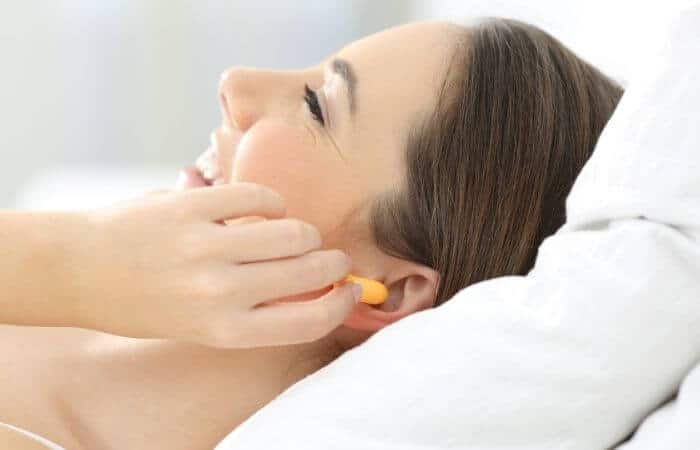
Earplugs can also push earwax back into your ear, causing a buildup which can lead to problems such as temporary hearing loss.
They can also cause ear infections due to the bacteria on the earplugs that build up with regular use.
Earplugs are an inexpensive option but there are some far superior alternatives.
Noise cancelling headphones certainly have the upper hand as they don’t put unwanted pressure on your ears, there’s no risk of them pushing too far into your ear canal and you can enjoy music through them too.
Noise cancelling headphones and earplugs are designed to do very different jobs.
An ear plug is designed to sit in your ear canal and block outside noise whereas noise cancelling headphones block out noise while also giving you the option of listening to music too.
If you have found that earplugs cause soreness and pain when you use them overnight, it is worth trying noise cancelling headphones instead.
Choosing Noise Cancelling Headphones for Sleeping
There are 3 main types of noise cancellation headphones worth considering for overnight use. These are:
1. On-ear Headphones
On-ear headphones are good if you don’t like the idea of having an earbud in your ear canal as you sleep.
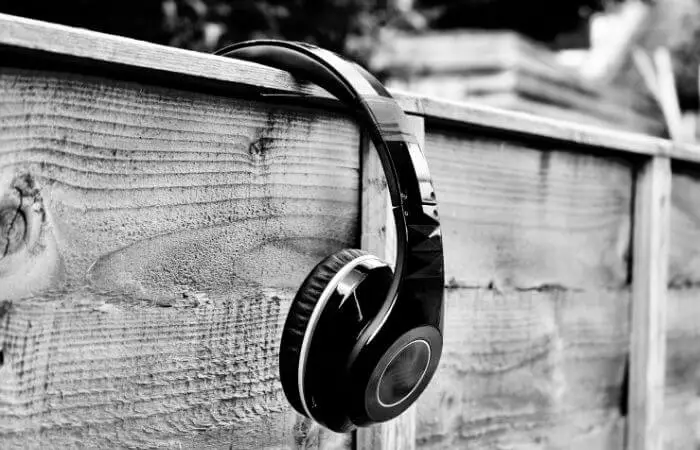
They are large as they completely cover your ears but this also gives you the benefit of effective noise cancelling.
On-ear headphones tend to be passive noise-canceling meaning they use material to block the sound but some offer a combination of passive and active noise cancellation which makes them effective against a wide range of sounds.
Unfortunately, these headphones will be uncomfortable for side sleepers but if you sleep on your back, they offer a great solution.
2. Earbuds
Earbuds are a good option but they need to be a good fit to be effective.
They are small in size and lightweight meaning they will be less likely to disturb you as you sleep.
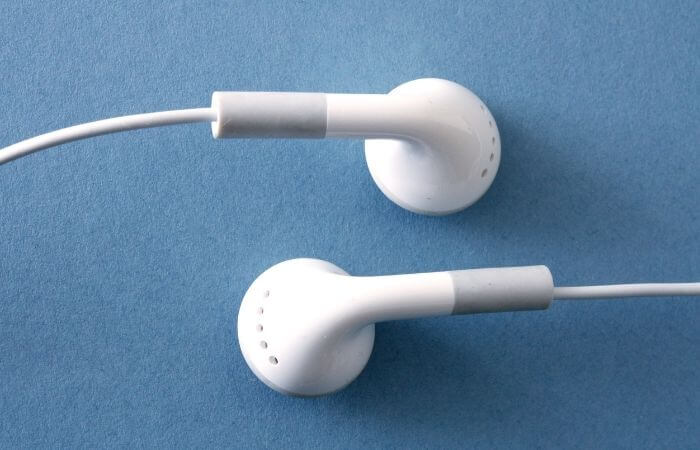
Some earbuds may dig into your ears and cause discomfort, particularly if you roll onto your side and accidentally put pressure on your ear.
If you are leaning towards earbuds as the best option for you, it’s also important to consider that wearing them for hours every night can increase bacteria levels in your ears.
Keep the earbuds clean and make sure you give your ears a break from the earbuds too.
3. Headbands
Headbands are designed specifically for wearing during sleep but there are not many options that feature noise-canceling technology.
A headband is a material strap that you pull over your head.
The headphone speakers are very flat and padded which makes them a good option for people who sleep on their sides.
They are often wireless so need to be charged before use and will connect to your audio source via Bluetooth.
Headbands are comfortable whether you sleep on your side or on your back and the material is usually soft and breathable.
Some include an eye mask to help you get a deep sleep. Try to find ones that are well-padded and offer at least passive noise cancelling so you can get the most benefit from them.
When choosing the best type of headphones for you, it comes down to personal preference and which type of headphone you feel most comfortable wearing at night.
There is noise cancelling versions of each of the above types.
They each have their pros and cons but can all offer a comfortable solution so you can enjoy a good night sleep.
Also Read: The 5 best noise cancelling headphones for working out
Wired vs Wireless Headphones
Another key factor to consider when choosing noise-canceling headphones to wear while you sleep is whether you would prefer wired or wireless ones:
- Wireless headphones tend to be better for sleeping as you don’t have to worry about getting tangled up in the wire.
However, it does mean the headphones will need to be charged and the battery power may not last the whole night.
If you choose wireless headphones, be sure to find out how long the battery life is on one charge before buying.
- Wired headphones are convenient as you don’t need to worry about charging them up.
However, they can be awkward as you can get caught up in the wire and it is quite easy to pull the wire from the device which will stop the music or podcast you are listening to.
There is a safety risk with sleeping while wearing wired headphones, particularly if you are a restless sleeper so keep this in mind.
Wired headphones may be good for occasional use but if you will be using your headphones each night, consider finding wireless alternatives to improve your comfort level.
Can the Headphones Get Damaged While I Sleep?
It is unlikely that the headphones will get damaged while you are sleeping.
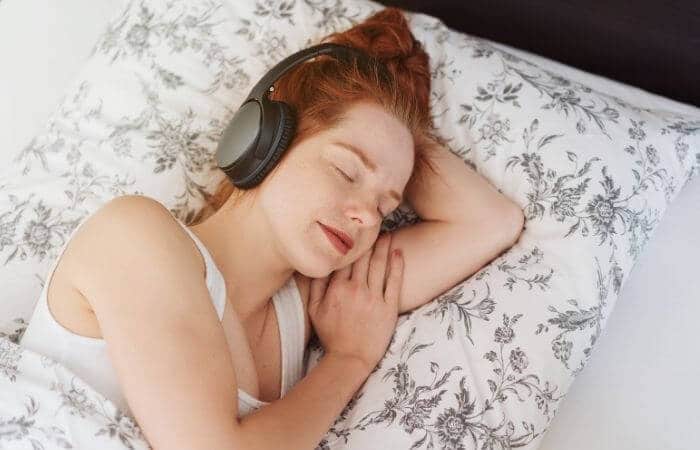
The biggest risk to your headphones is bending the cable if you roll onto it during the night.
Headphones that are specifically designed for wearing while sleeping tend to just be smaller in size to make them more comfortable.
This can actually make them slightly more susceptible to usual wear and tear.
Which Headphones Are Best for Side Sleepers?
If you find it most comfortable to sleep on your side, we’d suggest looking at earbuds or headbands that use noise cancellation technology.
As earbuds are smaller in size you should be able to find some that are comfortable to wear when sleeping.
If you can, steer clear of over ear/ on ear headphones as these are big, bulky and will not be a suitable option if you are sleeping on your side.
Are Noise Cancelling Headphones Effective Against Snoring?
Yes. Noise cancelling headphones are great at blocking out the sound of snoring.
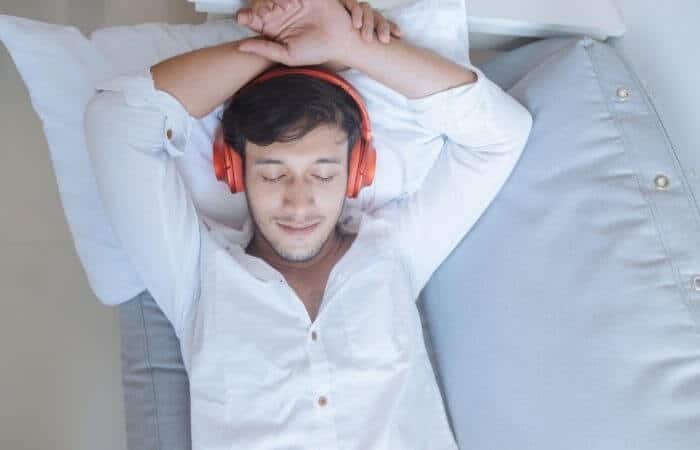
They also let you listen to audio which can help distract you from external noise too.
Generally, loud and sudden noises can still be heard through noise cancelling headphones but other noises such as the continuous snore of your partner or the buzz of traffic on a nearby busy road are effectively blocked out.
Improve Sleep Quality with Noise Cancelling Headphones
Not all headphones are good for sleeping, standard headphones won’t help you stay in a deep sleep if your partner snores, if your neighbours are loud or you live in a noisy place.
However, noise-canceling headphones are ideal for helping you get a full night of rest.
They will help to reduce external sounds even if you aren’t listening to music or anything.
Wearing noise cancelling headphones can help you fall asleep quicker, sleep for longer and will help prevent you from being woken up by the usual nighttime sounds.
They are a perfect option if you:
- Are a light sleeper
- Live in a busy neighbourhood
- Live with someone who snores
- Live with someone who likes to fall asleep to the sound of the TV/ fan/ music etc.
It is recommended we get 7-9 hours of sleep each night. According to the NHS, one in three of us suffers from poor sleep.
Not getting enough sleep can leave you feeling fatigued and has an impact on your mental and physical health.
Some effects of sleep deprivation include:
- Irritability
- Mood changes
- Decreased memory
- Weekend immunity
- Trouble concentrating
- Impaired hand-eye coordination
Pros and Cons of Wearing Noise Cancelling Headphones When Sleeping
Still deciding whether to wear noise-canceling headphones to help you sleep?
We’ve rounded up the pros and cons to help make the decision easier for you.
Noise-canceling headphones are safe to wear when sleeping and they can be comfortable too, providing you find the right pair.
Pros:
1. Block out a range of sounds including snoring and traffic
Noise-canceling headphones use technology and/ or soundproofing materials to block out sounds before you hear them.
They can help stop a range of noise bothering you while you are asleep and are particularly effective against common noises such as snoring and traffic.
2. Allows you to listen to music/ podcasts
With noise cancelling headphones you can still enjoy your favourite relaxing music or meditative melodies while you are falling asleep.
3. Can be used without music/ podcasts too
Just because you can listen to music, doesn’t mean you have to.
The headphones are still effective even if you are not listening to any audio through them.
Those with active noise cancellation technology will need to be charged in order to work even if you aren’t listening to music.
4. Reduce stress and increase sleep
Noise cancelling headphones will help you experience less stress and fewer distractions and enjoy a deeper, fuller night of sleep.
5. Wireless options available
There are plenty of wireless noise cancellation headphones to choose from so you can be comfortable while enjoying well deserved rest.
Cons:
1. High cost
Noise cancelling headphones are more expensive than regular headphones and cost considerably more than old-fashioned earplugs.
2. Can be difficult to find a comfortable option
This is true of all headphone types and may be made more difficult depending on what position you sleep in.
It can take a bit of trial and error to find the most comfortable headphones for you.
3. Some in-ear options can put pressure on eardrums
Wearing in-ear headphones can put pressure on your ears if you lay on them or accidentally push against them while you are asleep.
4. Can be dangerous to hearing if the volume is too high
As with all headphones, listening to audio with the volume turned all the way up will damage your ears.
Try to avoid listening to music at high volumes for a long period of time to protect your hearing.
As noise-canceling headphones help to silence your surroundings you won’t need to crank the music up so high.
As an Amazon Associate I may earn a small fee from qualifying purchases at no extra cost to you. This helps us run the site, so thanks for your support!
